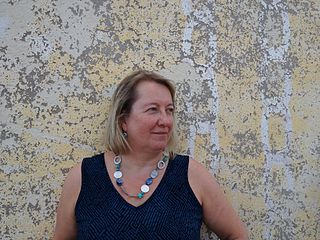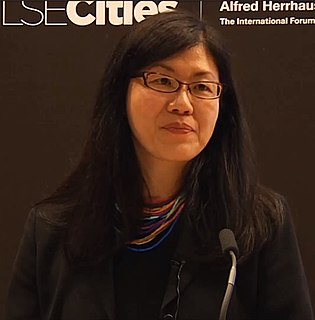Related Research Articles

Sustainable agriculture is farming in sustainable ways meeting society's present food and textile needs, without compromising the ability for current or future generations to meet their needs. It can be based on an understanding of ecosystem services. There are many methods to increase the sustainability of agriculture. When developing agriculture within sustainable food systems, it is important to develop flexible business process and farming practices.
The Earth Institute is a research institute at Columbia University that was established in 1995. Its stated mission is to address complex issues facing the planet and its inhabitants, with a focus on sustainable development. With an interdisciplinary approach, this includes research in climate change, geology, global health, economics, management, agriculture, ecosystems, urbanization, energy, hazards, and water. The Earth Institute's activities are guided by the idea that science and technological tools that already exist could be applied to greatly improve conditions for the world's poor, while preserving the natural systems that support life on Earth.
Reid Bryson was an American atmospheric scientist, geologist and meteorologist. He was a professor emeritus of the University of Wisconsin–Madison. He completed a B.A. in geology at Denison University in 1941 and a Ph.D. in meteorology from the University of Chicago in 1948. In 1946 he joined the faculty of the University of Wisconsin–Madison, and in 1948 he became the founder and first chairman of the University of Wisconsin-Madison's Department of Meteorology and Center for Climatic Research. He was the first director of the Institute for Environmental Studies in 1970.
A sustainable food system is a type of food system that provides healthy food to people and creates sustainable environmental, economic and social systems that surround food.
The Lancaster Environment Centre (LEC) in Lancaster, England, is an interdisciplinary centre for teaching, research and collaboration at Lancaster University, founded in 2003.

Ruth S. DeFries is an environmental geographer who specializes in the use of remote sensing to study Earth's habitability under the influence of human activities, such as deforestation, that influence regulating biophysical and biogeochemical processes. She was one of 24 recipients of the 2007 MacArthur Fellowship, and was elected to the United States National Academy of Sciences in 2006.
The term food system is used frequently in discussions about nutrition, food, health, community, economic development and agriculture. A food system includes all processes and infrastructure involved in feeding a population: growing, harvesting, processing, packaging, transporting, marketing, consumption, distribution and disposal of food and food-related items. It also includes the inputs needed and outputs generated at each of these steps. A food system operates within and is influenced by social, political, economic, and environmental contexts. It also requires human resources that provide labor, research and education. Food systems are either conventional or alternative according to their model of food lifespan from origin to plate.

The environmental impact of agriculture is the effect that different farming practices have on the ecosystems around them, and how those effects can be traced back to those practices. The environmental impact of agriculture varies widely based on practices employed by farmers and by the scale of practice. Farming communities that try to reduce environmental impacts through modifying their practices will adopt sustainable agriculture practices. Though some pastoralism is environmentally positive, modern animal agriculture practices tend to be more environmentally destructive than agricultural practices focused on fruits, vegetables and other biomass.
John D. Hamaker (1914–1994), was an American mechanical engineer, ecologist, agronomist and science writer in the fields of soil regeneration, rock dusting, mineral cycles, climate cycles and glaciology.
At the global scale sustainability and environmental management involves managing the oceans, freshwater systems, land and atmosphere, according to sustainability principles.

Josep Penuelas or Josep Peñuelas i Reixach is a research professor of the National Research Council of Spain (CSIC). Director of the CREAF-CSIC-UAB Global Ecology Unit located at CREAF -Universitat Autònoma de Barcelona. He is an ecologist working on global ecology, plant ecophysiology, chemical ecology, remote sensing, geosciences and atmosphere-biosphere interactions.
Zeyaur R. Khan is a professor and the principal scientist at International Centre of Insect Physiology and Ecology (icipe). He has dedicated his 30-year career as an international agricultural scientist to advancing the science and practice of agriculture by studying and applying chemical ecology, behavior, plant-plant and insect-plant interactions to improve farm productivity to combat poverty and food insecurity in Africa. He is responsible for the discovery and wide scale implementation of a pro-poor scientific innovation for enhancing food security and environmental sustainability in Africa]. This was achieved through the biologically-based IPM technology called "Push-Pull", developed for small-holder cereal-livestock African farmers. Prof. Khan’s work is an example demonstrating that creativity and innovation in science can provide practical solutions for the real problems of thousands of small-holder poor farmers and promote their food security and sustainable livelihoods.

Diana Liverman is Regents Professor of Geography and Development, and formerly co-Director of the Institute of the Environment at the University of Arizona, USA. She is an expert on the human dimensions of global environmental change and the impacts of climate on society. She was a co-author of the Intergovernmental Panel on Climate Change (IPCC) October 8, 2018 Special Report on Global Warming of 1.5ºC.
The contributions of women in climate change have received increasing attention in the early 21st century. Feedback from women and the issues faced by women have been described as "imperative" by the United Nations and "critical" by the Population Reference Bureau. A report by the World Health Organization concluded that incorporating gender-based analysis would "provide more effective climate change mitigation and adaptation."
Francis Patton Bretherton is an applied mathematician and a professor emeritus of the Department of Atmospheric and Oceanic Sciences at the University of Wisconsin, Madison.
Erle Christopher Ellis is an American environmental scientist. Ellis's work investigates the causes and consequences of long-term ecological changes caused by humans at local to global scales, including those related to the Anthropocene. As of 2015 he is a professor of Geography and Environmental Systems at the University of Maryland, Baltimore County where he directs the Laboratory for Anthroecology.

Karen Ching-Yee Seto is a geographer, urbanization and land change scientist, and Frederick C. Hixon Professor of Geography and Urbanisation Science at Yale University. She is an expert on contemporary urbanisation and sustainability, and satellite remote sensing. She is the co-lead for the chapter on urban mitigation in Intergovernmental Panel on Climate Change (IPCC) 6th Assessment Report and was the co-lead of the chapter on "Human Settlements, Infrastructure and Spatial Planning," for the IPCC 5th Assessment Report. She serves as the co-editor-in-chief of the scientific journal Global Environmental Change. She is an elected a member of the U.S. National Academy of Sciences (NAS), the Connecticut Academy of Science and Engineering (CASE), and the American Association for the Advancement of Science (AAAS).
Molly Jahn is an American plant geneticist and breeder and Professor of Agronomy at University of Wisconsin-Madison, USA. She was Under Secretary of Research, Education and Economics in the U.S. Department of Agriculture.
References
- ↑ "Geography professor Navin Ramankutty is challenging students in the Sustainability, Science and Society program to come up with ways to feed the world in 2050 when climate change and natural disasters like this flooding near Fargo, N.D., affect the amount and usefulness of good arable land.". Scott Olson, GETTY IMAGES FILE, The Gazette , 05.11.2011[ clarification needed ]
- ↑ "Farming in a Changing Climate". The Agenda, TVOntario, aired October 26, 2015.
- ↑ "Can organic be profitable? If the price is right, WSU study says". Seattle Times, June 1, 2015
- ↑ Andrew M. Barton; Alan S. White; Charles V. Cogbill (2012). The Changing Nature of the Maine Woods. UPNE. pp. 113–. ISBN 978-1-61168-295-3.
- ↑ "Crops play a major role in the annual CO2 cycle increase". University of Wisconsin-Madison, Nov. 19, 2014, by Kelly April Tyrrell
- ↑ Committee on Scientific Accomplishments of Earth Observations from Space (17 December 2007). Earth Observations from Space:: The First 50 Years of Scientific Achievements. National Academies Press. pp. 139–. ISBN 978-0-309-18566-0.
- ↑ New Scientist. New Science Publications. 2008. p. 14.
- ↑ "Is there room for organics? ", Cosmos, 17 Feb 2014
- ↑ Google Scholar Report